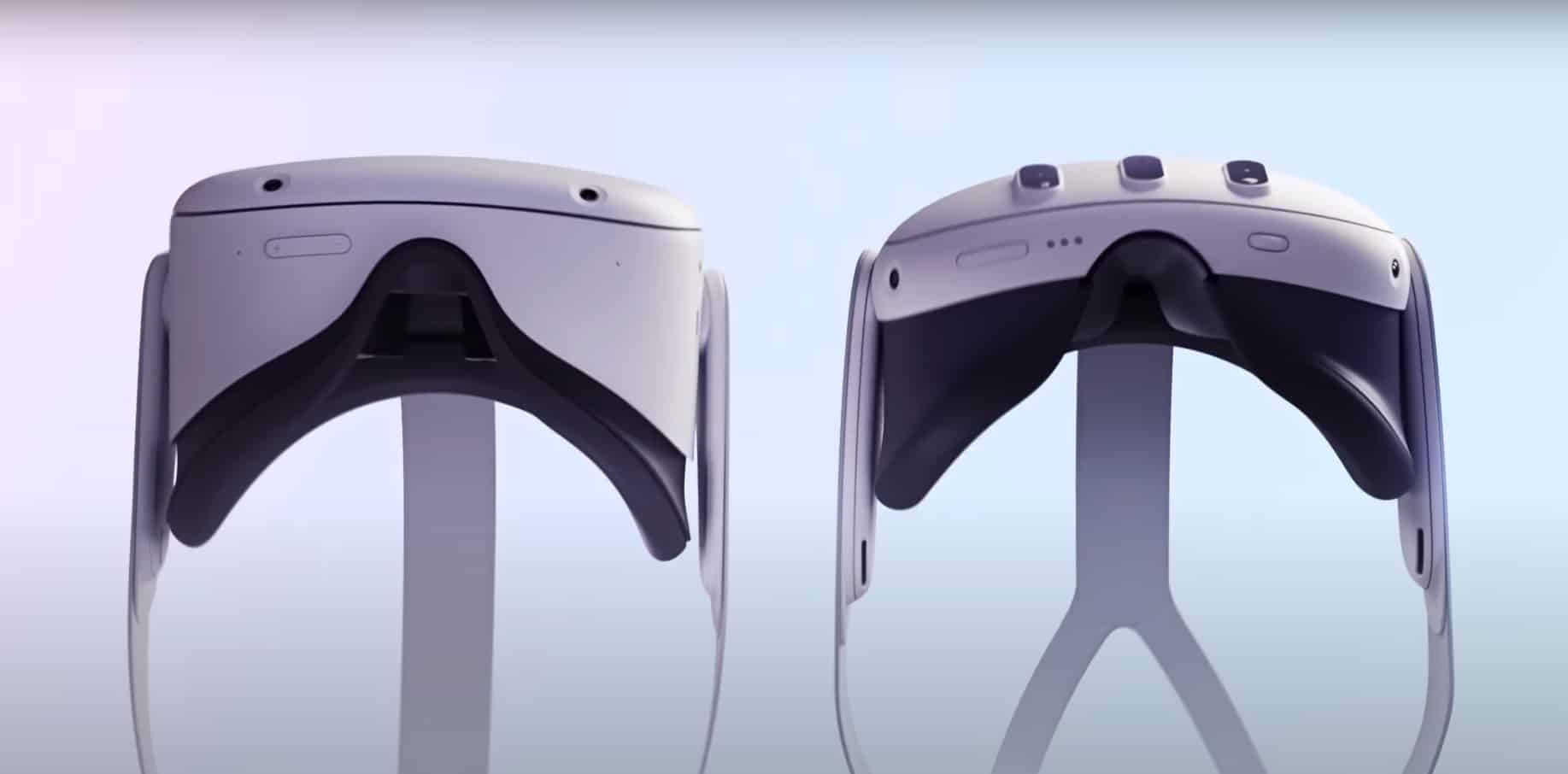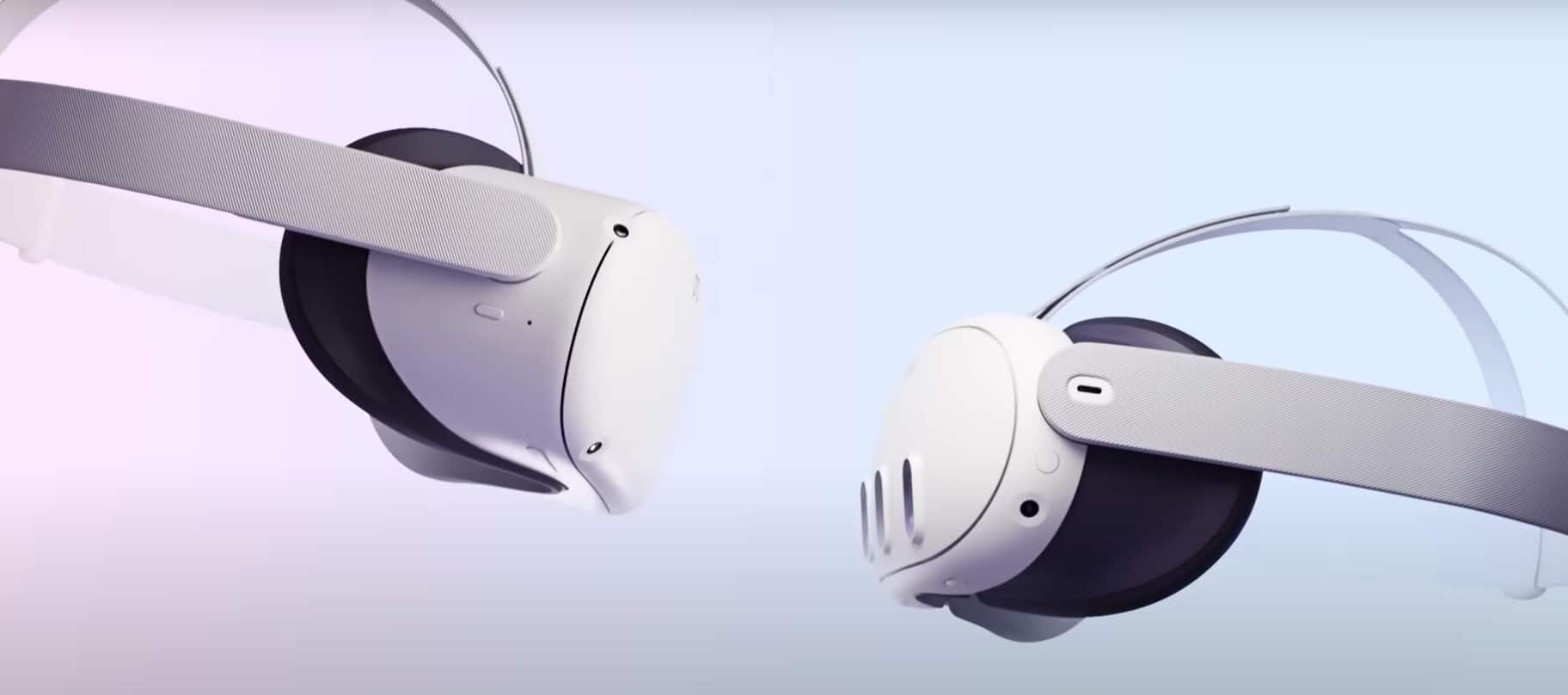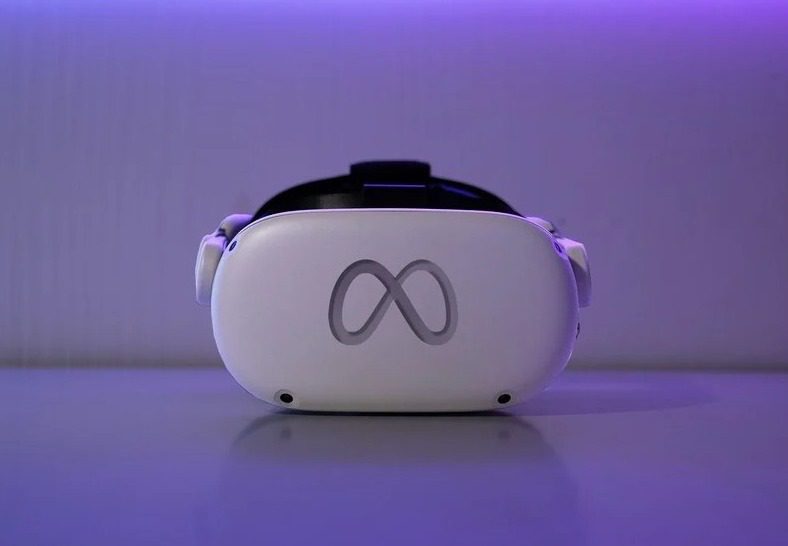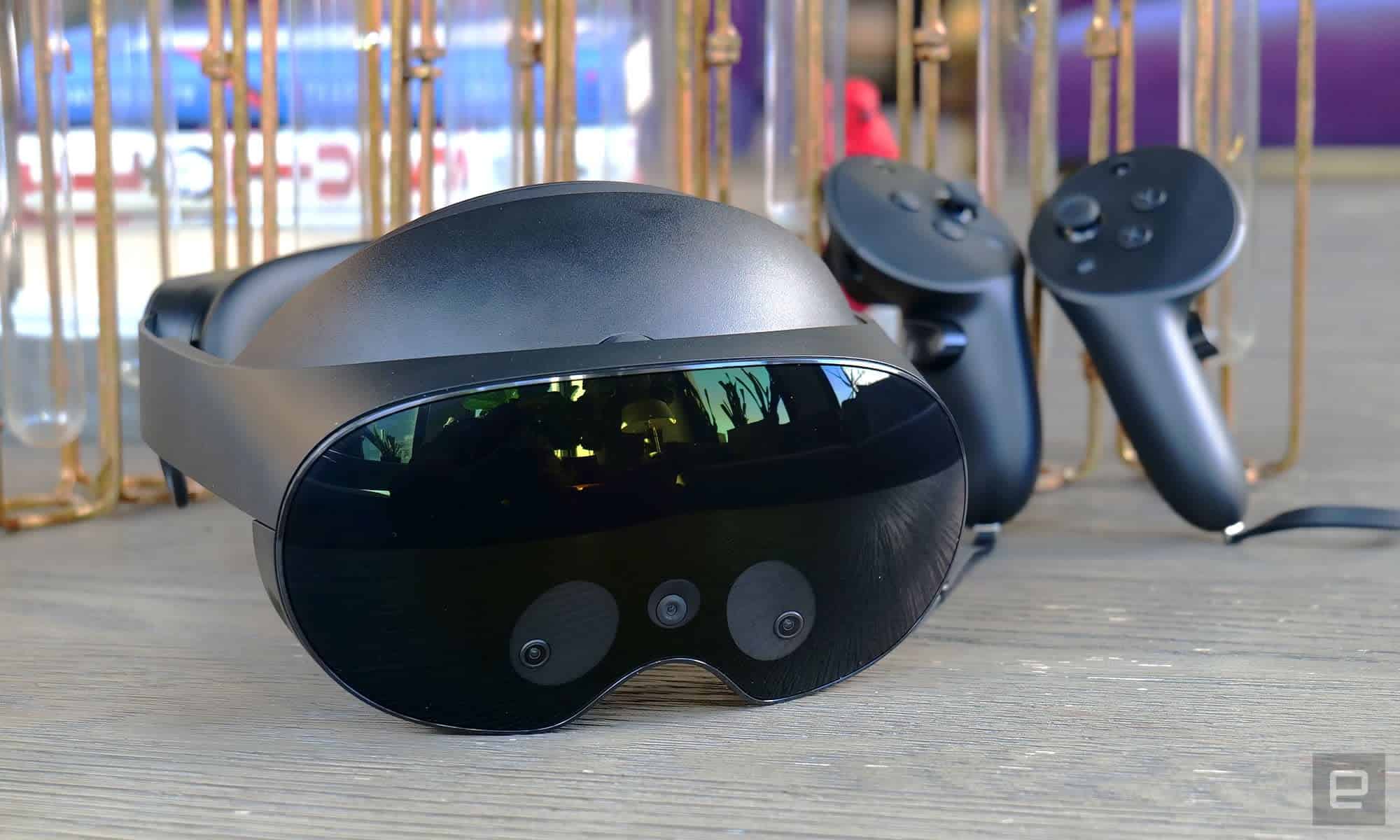Virtual reality headsets seem to be the latest thing that the tech world wants to throw our way. If we consider that companies like Google, HTC, and Microsoft have tried to make them work and failed spectacularly, the prospect of adoption for this technology seems to be back —again— with Apple’s attempt and with Mark Zuckerberg’s Meta Quest 3.
The Meta Quest 3, an attempt at VR headsets coming from the same makers of that spectacular fail that was “The Metaverse” will land on the streets in a couple of months, so here’s what we know so far about Meta’s take on a concept that has had a rough patch in being accepted by the public when developed by other companies with greater experience in the gadget world.

Will Meta Quest 3 Succeed Where Others Have Failed?
As many of us are aware, Meta (formerly Facebook) is not just a hardware company, but a tech company with a strong focus on applications, advertisements, and data. It is intriguing to see their latest venture into the hardware realm, particularly with their recent attempt at developing a virtual reality headset.
This new product comes as the third iteration, following the debut model in 2019 and the subsequent Quest 2 released in October 2020. Surprisingly, neither of these devices managed to make a significant impact in the consumer electronics market.
It is worth noting that Meta’s endeavor is set against a backdrop of previous technological flops from big tech competitors, including Google’s ill-fated Google Glasses and Daydream VR, Microsoft’s ambitious yet underwhelming HoloLens, Magic Leap’s One that failed to meet expectations, Snapchat’s Snap Spectacles, and HTC’s Vive series.
All of these ventures share common themes, such as exorbitant price tags exceeding $1000, persistent issues related to battery life and functionality, lack of a clear purpose, privacy concerns, disappointing product launches with inadequate leadership, and ultimately facing rejection from consumer society.
Now the question arises: will Meta’s Quest 3 successfully overcome these hurdles and break the cycle of failed attempts?
Companies with near-infinite access to experience and resources have failed dramatically at this tech niche trying to deliver that Ready Player One experience, and with big competitors like Apple trying to make it happen, it’s a very uphill climb for a rather inexperienced, hardware and human resource scarce company like Meta to triumph where other’s have failed.
Zuckerberg’s firm has very little to bring to the table when you consider that other VR/AR experts moved away from Meta to companies like Disney after the spectacular fail at Meta’s pitch for that “Metaverse”, a clunky, weird and useless attempt at mindless consumerism.
Only time will provide us with the answer, as we eagerly await the fate of this new undertaking.
Meta Quest 3 VR Headset Release Date
The Meta Quest 3 VR Headset has been confirmed by Mark Zuckerberg’s Meta on 27 September 2023.
Meta Quest 3 VR Headset Official Trailer
Meta Quest 3 VR Headset Specs
The Meta Quest 3 VR Headset will feature a 128GB storage capacity, 16GB RAM, and up to 512GB expanded storage, all with a potent Qualcomm Snapdragon XR2 chipset to power the three sensors in the front, and a depth sensor middle camera.
On the outside, aside from its texturized borders, adjustable straps, more space for the nose and ears, and ergonomic, haptic feedback Touch Pro controllers, the device will boast a library of more than 500 titles and will come with “Asgard’s Wrath 2” pre-installed.
Faster, Thinner, Lighter
The Quest 3 is marketed as the fastest of its genre with that Qualcomm chip, it seems to be lighter, its futuristic look is what you’d expect from these kinds of devices, and thanks to its six new cameras, two for tracking, and four increased depth with sensors, the developers claim that the immersiveness will be greatly enhanced.
The developers claim that the charging for this device will be faster and optimized, as well as the fact that the device is slimmer than its predecessors. With a resolution of 4128×2208 pixels, users will experience sharper images with 120Hz refresh rates —by default, greatly enhancing the user experience while reducing the discomfort that lower refresh rates bring.
Meta Compromises On Controllers For The Quest 3
The Quest 3 controllers seem pretty much like their predecessors, they have an ergonomic design with texturized borders and bezels with a compact look. The button placement remains the same.
And Meta is compromising on the controllers to keep the prices low because you’ll have to power these handhelds with AA batteries instead of having the opportunity to put built-in batteries that could be recharged.
Software For More Than Gaming
Additionally, Meta plans to further develop more than 40 apps ahead of its launch so users can best take advantage of this device aside from its obvious entertainment and gaming marketing.
Software-wise it all points to be like Meta’s Quest 3 will have a homebrew version of Android 12 with an AirLink PC-tether if you should choose to indulge.
You’ll have a web browser, multitasking, multiple windows, better tracking, and in essence, the benefits of augmented reality.
What is Smart Guardian?
Smart, developed by Meta, addresses safety concerns arising from the immersive experiences these products offer.
Remember those memes back in the time of the Nintendo Wii era where the user would forget to put the wrist strap and end up smashing the controller against the TV?
Well, with users often losing awareness of their surroundings, hilarious and occasionally risky instances occur, such as accidentally bumping into corners, breaking something or hurting themselves.
Those were endless material for meme-worthy moments that could be shared on platforms like 9Gag, Reddit, or TikTok, quickly going viral and capturing the attention of viewers around the world.
To mitigate such mishaps, the Quest 3 utilizes front sensors that scan and map the room, providing users with real-time updates about their surroundings.
This proactive approach ensures users stay informed and can avoid any potential accidents.

Meta Quest 3 VR Headset Price
As previously mentioned, one of the significant challenges faced by VR headsets is their expensive price point. This is also true for Apple’s VR headset, the Vision Pro, which is set to cost $3500.
The hefty price tag puts it on par with the cost of a competitive gaming laptop, making it a significant investment for consumers. In an economy plagued by rising inflation and the high cost of living, it’s understandable that consumers may be compelled to explore alternative options or seek more affordable alternatives.
However, Meta’s Quest 3 aims to overcome this obstacle by offering a VR headset at a more affordable price point. Priced at $500, the Meta Quest 3 is positioned as the brand’s higher-end version, in contrast to its predecessor, the Quest 2, which was priced at $400.
With this pricing strategy, Meta acknowledges the importance of catering to a diverse consumer base while also striving to deliver an enhanced VR experience.
By providing a more affordable option without sacrificing quality, Meta hopes to capture the attention of consumers who may have been deterred by the high costs associated with other VR headsets.
This strategic approach may allow Meta to carve out a niche for itself in the competitive VR market, appealing to individuals who are seeking both value and performance in their virtual reality experiences.

Who Will Benefit From This Technology?
After taking a look at the past and present of the VR headset trajectory, it’s worth asking the question: Who benefits from this technology? Steve Jobs once praised the headphones as miraculous because they immersed you in the sound, but tech lacked the capacity to bring that same experience to the eyes.
And in the process, tech companies are trying to make that visual experience happen, but they haven’t been successful at it because of the aspects we’ve covered at the beginning of this piece.
So if you’re considering buying a Quest 3 or a Vision Pro or any other for that matter, ask yourself this question.
Are you really making an upgrade by immersing yourself in a world of digital pixels right into your retinas where you can substitute human touch by making digital contact, replace an outside stroll by walking anywhere you want digitally, conduct your business in any way you want while still having the same productivity problems created by too much distraction?
If the answer is yes, take the time to use that gadget and watch Ready Player One, and read George Orwell’s 1984 and Aldous Huxley’s Brave New World, and reflect on the meta-philosophy of what you’re doing.
Also Read: Virtual Reality MMORPG Manhwa Like Sword Art Online
Original Article (28/12/2022): The evolution of technology has allowed us to be more resourceful when it comes to experiencing life with most of the surreal feeling, and even after not being present in one place, we have been enabled to experience things virtually. One of the most gifted advancements in this field is the invention of Virtual Reality Gear and Headsets, which have become a favorite tool to immerse oneself in the technical virtual/alternate world.
In the year of 2019, the technical giant Meta, which was formerly known as Facebook, an American multinational technological conglomerate, released its first VR Headset of the series named ‘Oculus Quest’ which was later on changed to ‘Meta Quest’ in order to adhere to the new company’s identity.

Meta has been chosen as an umbrella term for all the products that are or will be released by Facebook, even though it was greatly emphasized that the products that are individual in nature should not be rebranded. This rebranding has been done to keep in mind the vision that Zuckerberg carried with the creation of ‘Metaverse”, which is a unified tag for all the products that fall under them.
Oculus Quest and Meta Quest are the same products/devices, but the only difference is that name has been changed post change of name of Facebook to Meta. Later on, in the year 2020, Mark Zuckerberg, the founder of Facebook, announced their second VR Headset in the line “Oculus Quest 2” on 16th September. The product was released next month, on 13th October 2020.

The extensive popularity and demand of the product spoke for the great performance in the market, and it was heavily popularised compared to its first installment. The product received a mix of positive and negative reviews from a range of users ranging from gamers, people who used it as a recreational device, workers, developers, and even people from professional fields.
Behind the creation of Meta Quest
Even though Meta Quest came into existence for public use in 2019, the device was well in the making from 2012 itself. It was initially founded by a group of funded individuals who were successful in raising about $921 million in the several rounds of the funding procedure that were held.

The company was a Kickstarter company, and later in the year of 2014, then Facebook acquired the rights to the products and capabilities of Oculus from them, and they were now the rightful owners of the creation and distribution of the VR headset.
Other than the Quest series, Oculus also released its other versions like Oculus Go and Oculus Quest Pro. All the products managed to penetrate the heavy and critical market of headsets and were successful in their endeavors with great sales and distribution all over the world.
(Co-written by Alberto Zambrano and Sanskriti)




